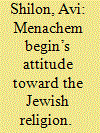| Srl | Item |
| 1 |
ID:
154870


|
|
|
|
|
| Summary/Abstract |
This article seeks to add another dimension to the growing and extensive research on right-wing Zionism, by returning to an era when the Likud was first created. I will examine the major difference between processes that have led to the two key landmarks in the formative years of the Right in Israel: the establishment of Gahal in April 1965 and the founding of the Likud in August–September of 1973. While Gahal's establishment was a product of a prolonged, determined, patient and conscious effort on the part of Menachem Begin, the establishment of the Likud was, to a considerable degree, forced upon him. Those who were interested in expanding Gahal and creating an alignment of centre-right parties were actually the factors outside Herut, while Herut's more veteran leadership disapproved of these attempts. Within the Herut Movement, the voices that called for the creation of a broad political alignment were those that came from Herut's ‘internal opposition’, which revolved around Ezer Weizman. The article analyses the reasons behind Begin's reservations about a continued right-wing merger, examines the negotiation process and sheds light on the oscillation in Menachem Begin's ideology and politics between the fundamental and the pragmatic poles.
|
|
|
|
|
|
|
|
|
|
|
|
|
|
|
|
| 2 |
ID:
145047


|
|
|
|
|
| Summary/Abstract |
This article argues that Menachem Begin’s religious ideology shaped many of his decisions in both domestic and foreign policy from his days as commander in the pre-State underground through his two terms as Israel’s prime minister. A traditionalist approach toward Judaism, in contrast to secularist streams of Zionist thought that previously prevailed, was central to his actions and won him the political support that propelled him into power.
|
|
|
|
|
|
|
|
|
|
|
|
|
|
|
|